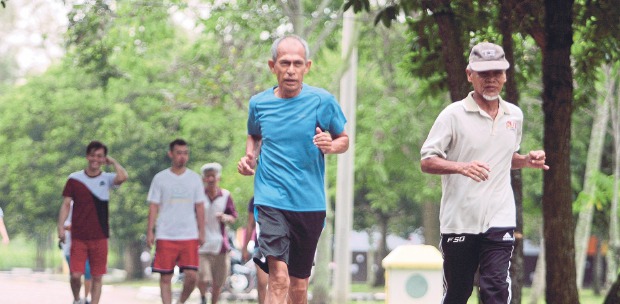WHEN I was in my 20s and 30s, I used to think that 50 was old. That's the half century mark. Heck, even turning 40 was dreaded because that spelled OLD in capital letters. The journey downhill has begun. How wrong I was!
Before you write me hate mails, hear me out. Back then, people retired when they turned 55 and enjoyed their so-called golden years, cosseted their grandchildren and just indulged in whatever they enjoyed because they never had the time for it before that.
I'm there now and I finally have a better understanding of my parents' issues and complaints when they were alive. It's rather after the fact, but I guess such is life. It's hard for the young to understand the old.
I became my parents' caregiver when they became seriously ill in their 70s. It was then that I saw the effects of ageing and understood it a little bit better. It was a gradual process, and some illnesses make people "age" faster than others.
What does ageing even mean? From what I've seen and read, it happens when many bodily functions begin to decline. I always thought this happens after we turn 60-something, but people don't become old or elderly at any specific age. Quite a few articles say that the beginning of old age begins at 65.
I've seen some fabulous octogenarians who seem to have cheated time and live a life that people half their age can only dream of. Yet, I've also met people who are "old" in their health, thoughts and demeanour, and they aren't even 40 yet! Some behave even older than parents!
AGE CREEPING UP
According to the National Institute of Ageing, "Ageing is associated with changes in dynamic biological, physiological, environmental, psychological, behavioural, and social processes. Some age-related changes are benign, such as graying hair. Others result in declines in function of the senses and activities of daily life and increased susceptibility to, and frequency of disease, frailty or disability. In fact, advancing age is the major risk factor for a number of chronic diseases in humans."
Ageing creeps up on you. It's a continuous process of natural change that begins in early adulthood. Nobody can stop ageing, but you can slow it down. You can prepare for it if you know what to expect. Ageing and what happens to your body is all about how your body works.
First, keep your mind active. Just like our muscles, the mind needs to be used and exercised. If you don't use it, you'll lose it! It's a fact that our brain shrinks as we get older. This means you'll have trouble remembering names and certain words to describe certain things.
It also makes it harder to pay attention and multitask at the same time. Doctors have told me that this isn't Alzheimer's disease per se, but are actually normal changes that happen as we age.
Alzheimer's and other types of dementia cause more severe trouble with memory and daily tasks. There are also tests that can be done to be certain of this.
We have to accept that our heart might not be able to withstand much stress as we age, both literally and figuratively. It may not be able to beat as fast when we exercise because the valves get stiffer and blood may not flow as efficiently as it used to.
You can keep your heart healthy and strong through exercise, a heart-healthy diet, and not smoking. Young people don't heed this fact, and older people try to make amends. It's never too late to start fresh, but check with your doctor about the do's and don'ts.
FUTURE SELF
On the topic of exercise, weight-bearing exercises can help, prevent and even reverse osteoporosis. As we age, muscles get weaker, and tendons that connect them to the skeleton get stiffer. This decreases strength and flexibility. Regular, gentle workouts may actually help to ease these joint aches and stiffness away.
Good quality sleep is the best "medicine" to heal our body. Good sleep and gentle workouts boost your body's immunity and defence system. Next is your digestive system. It's not just about what you eat. Your stomach lining becomes more fragile as you age.
As such, your digestive system might not move food through quite as well as before; hence, constipation. This would be made worse by lack of exercise and if you've been on medication for the various illness that you'd have been diagnosed with by the time you're 70.
At this point, you can't turn back the clock, but it's never too late to do something. Stay active physically and socially. Keep challenging yourself mentally. Go for medical check-ups and talk to your doctor about changes in your hearing, vision and other issues bothering you. Do something about it that your future self would thank you for.
[The views expressed in this article are the writer's own.]
Putri Juneita Johari volunteers for the Special Community Society of Ampang. She can be reached at [email protected].





